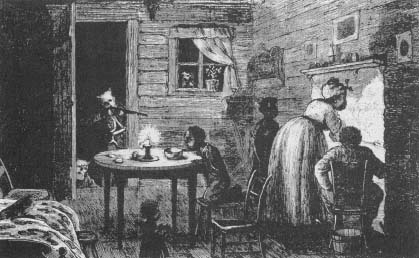South Carolina Ku Klux Klan Trials: 1871-72
The South Carolina Klan, The Ku Klux Klan Act, The Trials Begin, Suggestions For Further Reading
Defendants: Robert Hayes Mitchell, John W. Mitchell, Thomas B. Whitesides, John S. Millar (Miller), Edward T. Avery
Crimes Charged: Conspiracy to prevent blacks from voting; conspiracy to oppress, threaten, and intimidate blacks who had exercised their right to vote in 1870
Chief Defense Lawyers: Reverdy Johnson, Henry Stanbery, James F. Hart, C. D. Melton, W. B. Wilson and F. W. McMaster
Chief Prosecutors: Daniel H. Chamberlain, David T. Corbin
Judges: Hugh L. Bond, George S. Bryan
Place: Columbia, South Carolina
Date of Trial: December 1871-January 1872
Verdicts: Guilty
Sentences: Robert Hayes Mitchell: 18 months imprisonment and a $100 fine; John W. Mitchell: 5 years imprisonment and a$1,000 fine; Whitesides: 12 months imprisonment and a $100 fine; Millar: 3 months imprisonment and a $20 fine; Avery: fled before sentencing and later pardoned by President Ulysses S. Grant
SIGNIFICANCE: With the arrest and later trials of several Ku Klux Klan members in the South, particularly South Carolina, the federal government attempted to demonstrate the lengths it would go to in order to preserve the Fourteenth and Fifteenth Amendments to the Constitution.
Six bored Confederate veterans founded the original Ku Klux Klan (KKK) as a social club on December 24, 1865, in Pulaski, Tennessee. The organization existed less than 10 years, but for decades it was glorified as the instrument by which northern carpetbaggers and Radical Republicans were driven out of the South, illiterate and "savage" blacks were put down, and whites were restored to their "rightful place" in southern society. This myth reached its height in the early twentieth century with the 1905 publication of Thomas Dixon's novel The Clansmen, and the release 10 years later of D. W. Griffith's movie The Birth of a Nation; its truth is a fundamental tenet to every modern Klansman.
In reality, the original KKK was a brutal terrorist movement that lynched and shot hundreds and beat, whipped, raped, and mutilated thousands more. While most of its victims were black, other targets included northern whites who moved south after the Civil War, southern whites who supported the federal government's Reconstruction policy, and anyone who violated what the Klan considered the proper social order. A reign of terror existed throughout much of the former Confederacy, and in many places the state and local authorities could do nothing to stop it.
 Ku Klux Klan attacking black family inside their home.
Ku Klux Klan attacking black family inside their home.
Additional topics
- a Slave State of Missouri v. Celia: 1855 - Celia Speaks, The Trial Begins, On To The Missouri Supreme Court, Suggestions For Further Reading
- Slaughterhouse Cases - The Slaughterhouse Monopoly, Monopoly As "servitude", Equal Protection, Further Readings
- South Carolina Ku Klux Klan Trials: 1871-72 - The South Carolina Klan
- South Carolina Ku Klux Klan Trials: 1871-72 - The Ku Klux Klan Act
- South Carolina Ku Klux Klan Trials: 1871-72 - The Trials Begin
- South Carolina Ku Klux Klan Trials: 1871-72 - Suggestions For Further Reading
- Other Free Encyclopedias
Law Library - American Law and Legal InformationNotable Trials and Court Cases - 1833 to 1882